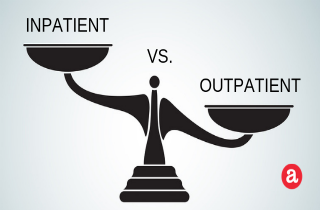Looking into quitting drugs for good?
Good for you! We’re here to support you on the journey. Here, you’ll find a review of the main differences between the two major types of drug rehab: inpatient vs. outpatient. Then, at the end, we invite your questions. In fact, we’ll try to answer all questions personally and promptly.
Main differences between inpatient and outpatient
1. Duration
Drug rehabilitation programs take different amount of time based on patient’s individual needs. In inpatient rehabs, people spend about 28-30 days to start. More severe cases of addiction take treatment from 90 days to a year or more. These programs include aftercare services through psychotherapy.
Outpatient drug rehabilitation does not require stay in a treatment facility, and attendance on counseling sessions daily or weekly. Average stay in outpatient drug rehab is from 12-16 weeks. Still, these programs last for several months or years, also depending on patient’s needs.
2. Cost
Because it includes room and board as well as intensive daily treatment, for instance, inpatient rehabilitation is generally much more expensive than outpatient. On average, individuals spend just above $2K for traditional outpatient drug rehab and $4K for intensive outpatient treatment while inpatient rehabilitation has an average cost of $10-19K per episode. A good amount of evidence-based, high-quality residential rehabs exist in the range of $18K to $35K per month.
3. Residence
Inpatient drug rehabilitation – Inpatient rehab offers food and housing. You must completely devote to the program, while being away from home.
Outpatient drug rehabilitation – People who attend outpatient rehab are stay at home and are maintaining their work, family and social relations. In outpatient setting you have greater freedom, while continuing with your daily activities.
4. Detox
Although detoxification is required for both in and outpatient programs before entering treatment, detox is usually only included in on-site inpatient rehabs. You’ll probably be referred to a medical detox clinic OUTSIDE an outpatient setting and be asked to return to treatment upon completion.
Inpatient drug rehabilitation versus outpatient
So, where should you go?
Basically, some people benefit from changing their environment and some not. Still, it’s hard to determine which treatment setting is most appropriate.
Here’s an example of how placement can get tricky. In outpatient settings, people can continue to live at home. They continue going to work and do all daily activities, while having less costs for treatment. On the other side, this treatment is not appropriate for people who experience suicidal thoughts, dysfunctional family relations, severe drug withdrawal and are not able to travel every day to the treatment facility where they take the therapy. In these cases, inpatient can be best.
Ultimately, it should be left to an addiction professional to determine, together with you and your loved ones, what option is best. Who can you consult with on this decision?
Speak to:
- A doctor who specializes in addiction
- A licensed addiction counselor or professional
- A licensed clinical social worker
- A psychiatrist
- A psychologist
These specialists can help assess or refer you to assessment for placement in either outpatient or inpatient drug rehab settings.
Similarities between in/outpatient drug rehabilitation
1. Assessment and progress reports
Detailed assessments help guide any stay in rehab. So, both types of rehab will include an intake process, with a 1-3 hour interview to learn more about you and patterns of drug use. Your case file will then be tracked throughout rehab, and adjusted if/when needed.
2. Foundational treatments
The base of both types of rehab is grounded in psychotherapy and behavioral therapy. Depending on the services offered, you’ll be encouraged to attend support group meetings and have individual or group counseling. Learning new life and coping skills through recreational/social activities and lectures about the cause and effect of addiction will help you understand your condition better.
3. Medical referrals for medications
Then, if it’s helpful or necessary, you may be referred doctors will prescribe a medication-assisted treatment which increases retention in treatment and reduce risky behaviors.
Effectiveness of inpatient drug rehabilitation vs. outpatient
The advantages and disadvantages of the rehab program will determine which setting is more appropriate for a particular person, but treatment setting itself does not appear to influence overall treatment outcome.
In case studies and clinical trials, neither inpatient nor outpatient drug rehabilitation has been found to be “most” effective. A number of questions remain unanswered concerning how to determine when a particular setting will be advantageous for a person. However, personal motivation and willingness to change are key indicators that influence treatment outcomes most.
Still have questions about rehab?
Doubts about which program will be better for you and what your ideal rehabilitation process should be like are expected. Please leave us your questions or comments, or concerns. We’ll do our best to respond to you personally and promptly.









Related Posts